Analyzing Mental Processes and Their Impact on Human Behavior
VerifiedAdded on 2022/08/26
|10
|2249
|31
Essay
AI Summary
This essay delves into the complex relationship between mental processes and human behavior, exploring how cognitive elements, motivations, and emotions shape individual actions. The essay examines the influence of both nature and nurture, awareness, and consciousness on behavior. It analyzes four research papers, including studies on hope as a behavior and cognitive process, coping mechanisms of parents with violent children, early-life adversity's impact, and barriers to cognitive behavioral therapy. The analysis highlights the importance of mental health, emotional derangements, and perceptions in determining behavior. The studies emphasize the role of awareness, knowledge, and perception in altering distorted behaviors, suggesting directions for future research. The essay provides a comprehensive overview of the mental processes involved in shaping human behavior, supported by relevant research and theoretical frameworks.
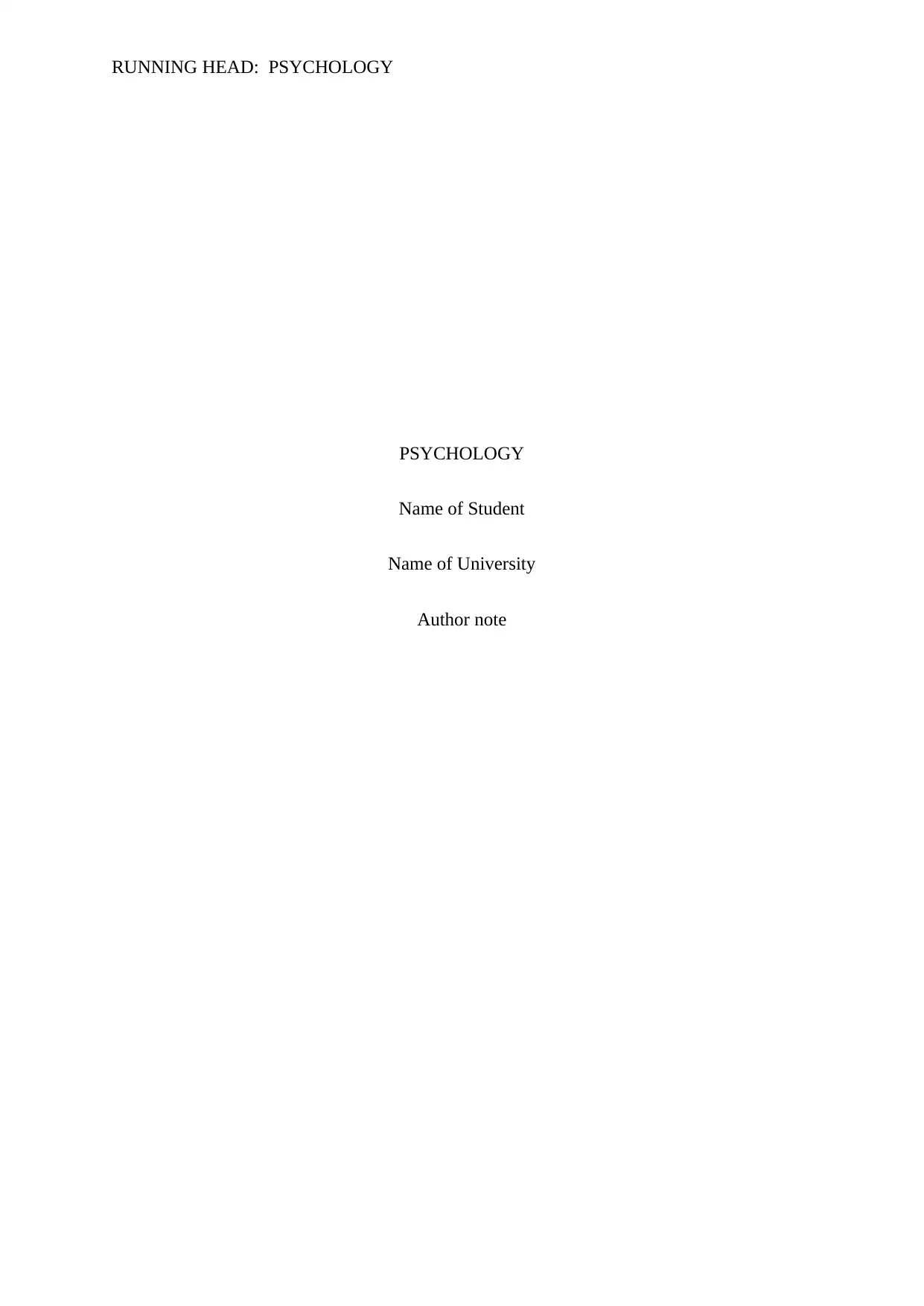
RUNNING HEAD: PSYCHOLOGY
PSYCHOLOGY
Name of Student
Name of University
Author note
PSYCHOLOGY
Name of Student
Name of University
Author note
Paraphrase This Document
Need a fresh take? Get an instant paraphrase of this document with our AI Paraphraser
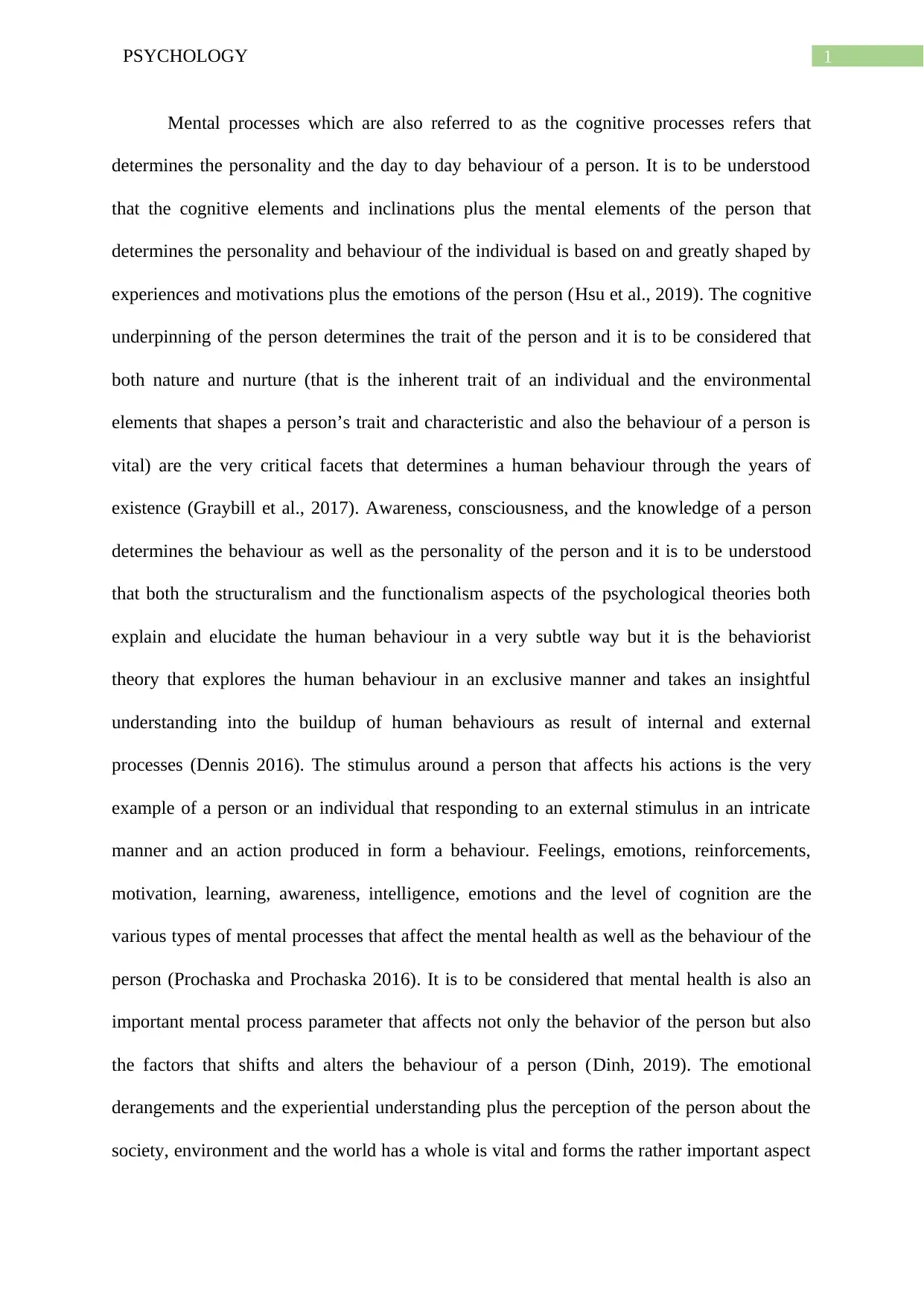
1PSYCHOLOGY
Mental processes which are also referred to as the cognitive processes refers that
determines the personality and the day to day behaviour of a person. It is to be understood
that the cognitive elements and inclinations plus the mental elements of the person that
determines the personality and behaviour of the individual is based on and greatly shaped by
experiences and motivations plus the emotions of the person (Hsu et al., 2019). The cognitive
underpinning of the person determines the trait of the person and it is to be considered that
both nature and nurture (that is the inherent trait of an individual and the environmental
elements that shapes a person’s trait and characteristic and also the behaviour of a person is
vital) are the very critical facets that determines a human behaviour through the years of
existence (Graybill et al., 2017). Awareness, consciousness, and the knowledge of a person
determines the behaviour as well as the personality of the person and it is to be understood
that both the structuralism and the functionalism aspects of the psychological theories both
explain and elucidate the human behaviour in a very subtle way but it is the behaviorist
theory that explores the human behaviour in an exclusive manner and takes an insightful
understanding into the buildup of human behaviours as result of internal and external
processes (Dennis 2016). The stimulus around a person that affects his actions is the very
example of a person or an individual that responding to an external stimulus in an intricate
manner and an action produced in form a behaviour. Feelings, emotions, reinforcements,
motivation, learning, awareness, intelligence, emotions and the level of cognition are the
various types of mental processes that affect the mental health as well as the behaviour of the
person (Prochaska and Prochaska 2016). It is to be considered that mental health is also an
important mental process parameter that affects not only the behavior of the person but also
the factors that shifts and alters the behaviour of a person (Dinh, 2019). The emotional
derangements and the experiential understanding plus the perception of the person about the
society, environment and the world has a whole is vital and forms the rather important aspect
Mental processes which are also referred to as the cognitive processes refers that
determines the personality and the day to day behaviour of a person. It is to be understood
that the cognitive elements and inclinations plus the mental elements of the person that
determines the personality and behaviour of the individual is based on and greatly shaped by
experiences and motivations plus the emotions of the person (Hsu et al., 2019). The cognitive
underpinning of the person determines the trait of the person and it is to be considered that
both nature and nurture (that is the inherent trait of an individual and the environmental
elements that shapes a person’s trait and characteristic and also the behaviour of a person is
vital) are the very critical facets that determines a human behaviour through the years of
existence (Graybill et al., 2017). Awareness, consciousness, and the knowledge of a person
determines the behaviour as well as the personality of the person and it is to be understood
that both the structuralism and the functionalism aspects of the psychological theories both
explain and elucidate the human behaviour in a very subtle way but it is the behaviorist
theory that explores the human behaviour in an exclusive manner and takes an insightful
understanding into the buildup of human behaviours as result of internal and external
processes (Dennis 2016). The stimulus around a person that affects his actions is the very
example of a person or an individual that responding to an external stimulus in an intricate
manner and an action produced in form a behaviour. Feelings, emotions, reinforcements,
motivation, learning, awareness, intelligence, emotions and the level of cognition are the
various types of mental processes that affect the mental health as well as the behaviour of the
person (Prochaska and Prochaska 2016). It is to be considered that mental health is also an
important mental process parameter that affects not only the behavior of the person but also
the factors that shifts and alters the behaviour of a person (Dinh, 2019). The emotional
derangements and the experiential understanding plus the perception of the person about the
society, environment and the world has a whole is vital and forms the rather important aspect
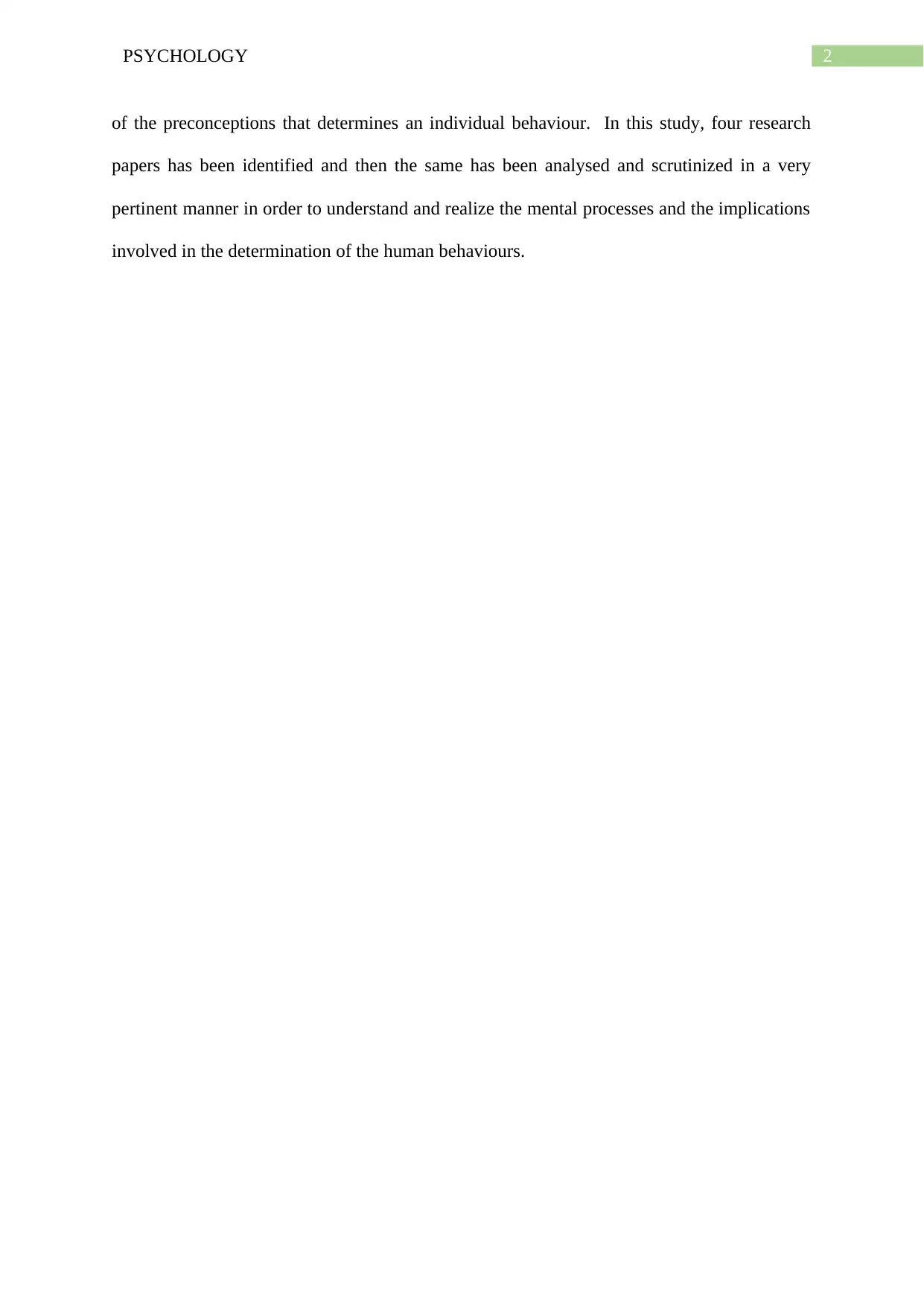
2PSYCHOLOGY
of the preconceptions that determines an individual behaviour. In this study, four research
papers has been identified and then the same has been analysed and scrutinized in a very
pertinent manner in order to understand and realize the mental processes and the implications
involved in the determination of the human behaviours.
of the preconceptions that determines an individual behaviour. In this study, four research
papers has been identified and then the same has been analysed and scrutinized in a very
pertinent manner in order to understand and realize the mental processes and the implications
involved in the determination of the human behaviours.
⊘ This is a preview!⊘
Do you want full access?
Subscribe today to unlock all pages.

Trusted by 1+ million students worldwide
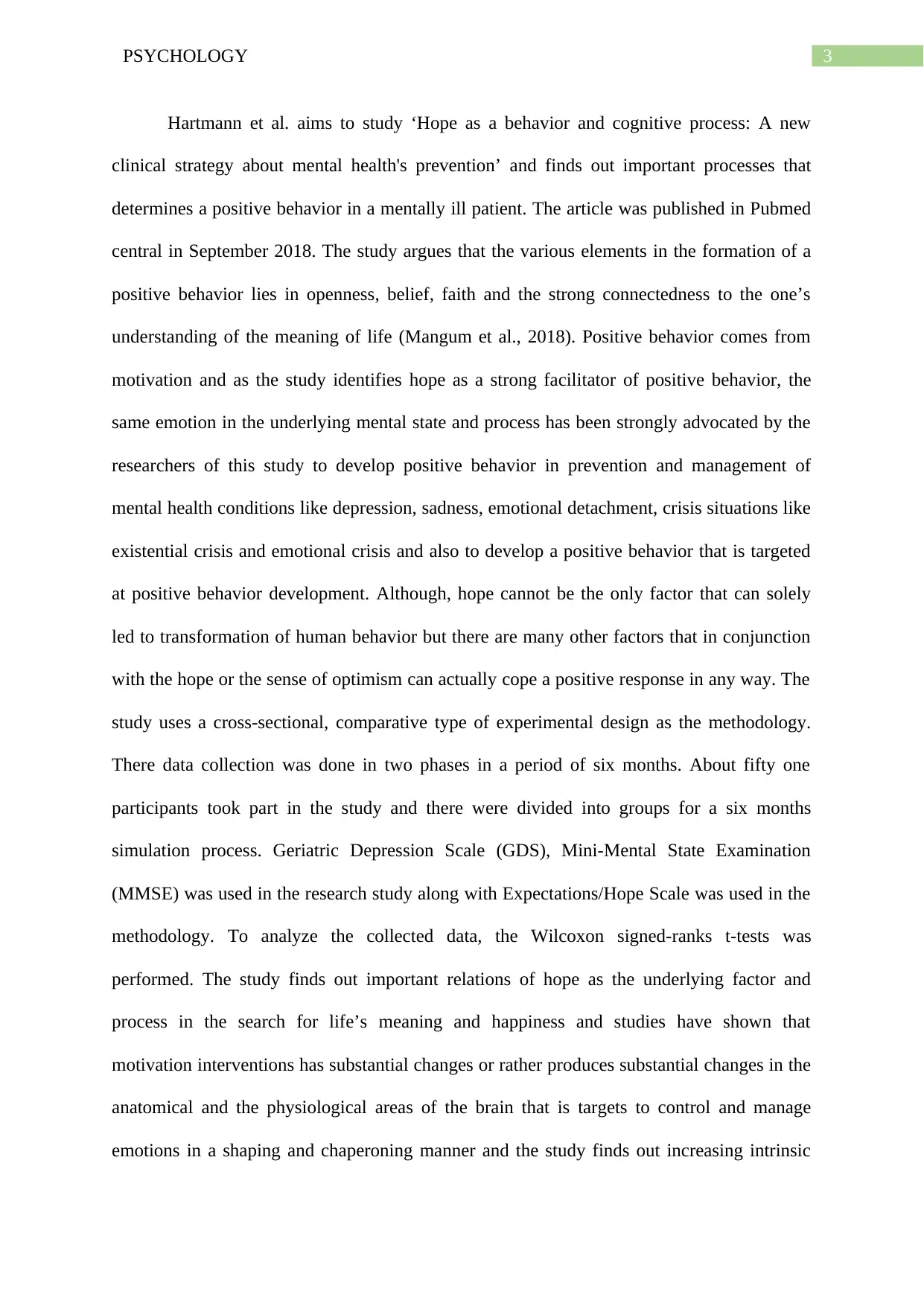
3PSYCHOLOGY
Hartmann et al. aims to study ‘Hope as a behavior and cognitive process: A new
clinical strategy about mental health's prevention’ and finds out important processes that
determines a positive behavior in a mentally ill patient. The article was published in Pubmed
central in September 2018. The study argues that the various elements in the formation of a
positive behavior lies in openness, belief, faith and the strong connectedness to the one’s
understanding of the meaning of life (Mangum et al., 2018). Positive behavior comes from
motivation and as the study identifies hope as a strong facilitator of positive behavior, the
same emotion in the underlying mental state and process has been strongly advocated by the
researchers of this study to develop positive behavior in prevention and management of
mental health conditions like depression, sadness, emotional detachment, crisis situations like
existential crisis and emotional crisis and also to develop a positive behavior that is targeted
at positive behavior development. Although, hope cannot be the only factor that can solely
led to transformation of human behavior but there are many other factors that in conjunction
with the hope or the sense of optimism can actually cope a positive response in any way. The
study uses a cross-sectional, comparative type of experimental design as the methodology.
There data collection was done in two phases in a period of six months. About fifty one
participants took part in the study and there were divided into groups for a six months
simulation process. Geriatric Depression Scale (GDS), Mini-Mental State Examination
(MMSE) was used in the research study along with Expectations/Hope Scale was used in the
methodology. To analyze the collected data, the Wilcoxon signed-ranks t-tests was
performed. The study finds out important relations of hope as the underlying factor and
process in the search for life’s meaning and happiness and studies have shown that
motivation interventions has substantial changes or rather produces substantial changes in the
anatomical and the physiological areas of the brain that is targets to control and manage
emotions in a shaping and chaperoning manner and the study finds out increasing intrinsic
Hartmann et al. aims to study ‘Hope as a behavior and cognitive process: A new
clinical strategy about mental health's prevention’ and finds out important processes that
determines a positive behavior in a mentally ill patient. The article was published in Pubmed
central in September 2018. The study argues that the various elements in the formation of a
positive behavior lies in openness, belief, faith and the strong connectedness to the one’s
understanding of the meaning of life (Mangum et al., 2018). Positive behavior comes from
motivation and as the study identifies hope as a strong facilitator of positive behavior, the
same emotion in the underlying mental state and process has been strongly advocated by the
researchers of this study to develop positive behavior in prevention and management of
mental health conditions like depression, sadness, emotional detachment, crisis situations like
existential crisis and emotional crisis and also to develop a positive behavior that is targeted
at positive behavior development. Although, hope cannot be the only factor that can solely
led to transformation of human behavior but there are many other factors that in conjunction
with the hope or the sense of optimism can actually cope a positive response in any way. The
study uses a cross-sectional, comparative type of experimental design as the methodology.
There data collection was done in two phases in a period of six months. About fifty one
participants took part in the study and there were divided into groups for a six months
simulation process. Geriatric Depression Scale (GDS), Mini-Mental State Examination
(MMSE) was used in the research study along with Expectations/Hope Scale was used in the
methodology. To analyze the collected data, the Wilcoxon signed-ranks t-tests was
performed. The study finds out important relations of hope as the underlying factor and
process in the search for life’s meaning and happiness and studies have shown that
motivation interventions has substantial changes or rather produces substantial changes in the
anatomical and the physiological areas of the brain that is targets to control and manage
emotions in a shaping and chaperoning manner and the study finds out increasing intrinsic
Paraphrase This Document
Need a fresh take? Get an instant paraphrase of this document with our AI Paraphraser
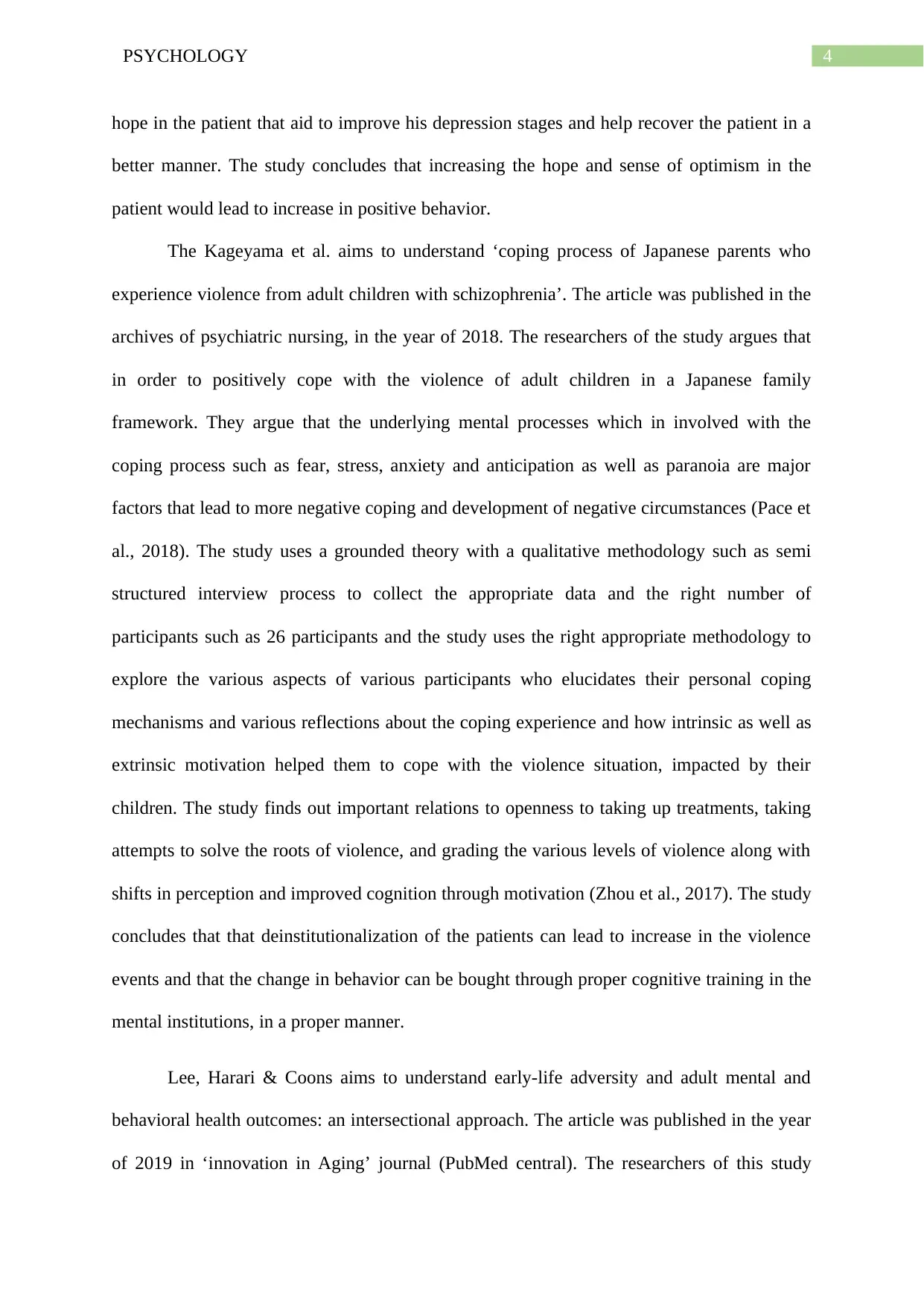
4PSYCHOLOGY
hope in the patient that aid to improve his depression stages and help recover the patient in a
better manner. The study concludes that increasing the hope and sense of optimism in the
patient would lead to increase in positive behavior.
The Kageyama et al. aims to understand ‘coping process of Japanese parents who
experience violence from adult children with schizophrenia’. The article was published in the
archives of psychiatric nursing, in the year of 2018. The researchers of the study argues that
in order to positively cope with the violence of adult children in a Japanese family
framework. They argue that the underlying mental processes which in involved with the
coping process such as fear, stress, anxiety and anticipation as well as paranoia are major
factors that lead to more negative coping and development of negative circumstances (Pace et
al., 2018). The study uses a grounded theory with a qualitative methodology such as semi
structured interview process to collect the appropriate data and the right number of
participants such as 26 participants and the study uses the right appropriate methodology to
explore the various aspects of various participants who elucidates their personal coping
mechanisms and various reflections about the coping experience and how intrinsic as well as
extrinsic motivation helped them to cope with the violence situation, impacted by their
children. The study finds out important relations to openness to taking up treatments, taking
attempts to solve the roots of violence, and grading the various levels of violence along with
shifts in perception and improved cognition through motivation (Zhou et al., 2017). The study
concludes that that deinstitutionalization of the patients can lead to increase in the violence
events and that the change in behavior can be bought through proper cognitive training in the
mental institutions, in a proper manner.
Lee, Harari & Coons aims to understand early-life adversity and adult mental and
behavioral health outcomes: an intersectional approach. The article was published in the year
of 2019 in ‘innovation in Aging’ journal (PubMed central). The researchers of this study
hope in the patient that aid to improve his depression stages and help recover the patient in a
better manner. The study concludes that increasing the hope and sense of optimism in the
patient would lead to increase in positive behavior.
The Kageyama et al. aims to understand ‘coping process of Japanese parents who
experience violence from adult children with schizophrenia’. The article was published in the
archives of psychiatric nursing, in the year of 2018. The researchers of the study argues that
in order to positively cope with the violence of adult children in a Japanese family
framework. They argue that the underlying mental processes which in involved with the
coping process such as fear, stress, anxiety and anticipation as well as paranoia are major
factors that lead to more negative coping and development of negative circumstances (Pace et
al., 2018). The study uses a grounded theory with a qualitative methodology such as semi
structured interview process to collect the appropriate data and the right number of
participants such as 26 participants and the study uses the right appropriate methodology to
explore the various aspects of various participants who elucidates their personal coping
mechanisms and various reflections about the coping experience and how intrinsic as well as
extrinsic motivation helped them to cope with the violence situation, impacted by their
children. The study finds out important relations to openness to taking up treatments, taking
attempts to solve the roots of violence, and grading the various levels of violence along with
shifts in perception and improved cognition through motivation (Zhou et al., 2017). The study
concludes that that deinstitutionalization of the patients can lead to increase in the violence
events and that the change in behavior can be bought through proper cognitive training in the
mental institutions, in a proper manner.
Lee, Harari & Coons aims to understand early-life adversity and adult mental and
behavioral health outcomes: an intersectional approach. The article was published in the year
of 2019 in ‘innovation in Aging’ journal (PubMed central). The researchers of this study
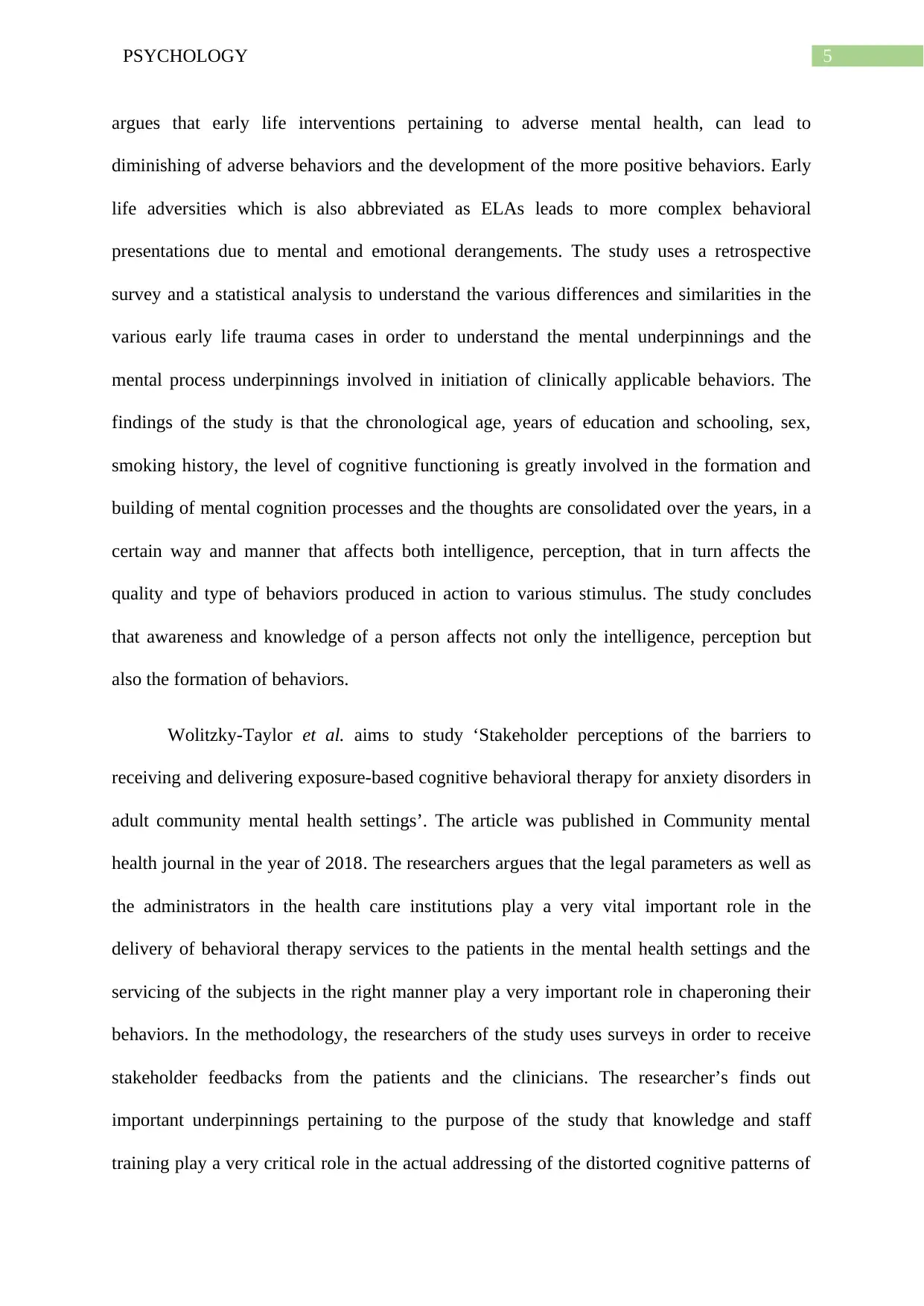
5PSYCHOLOGY
argues that early life interventions pertaining to adverse mental health, can lead to
diminishing of adverse behaviors and the development of the more positive behaviors. Early
life adversities which is also abbreviated as ELAs leads to more complex behavioral
presentations due to mental and emotional derangements. The study uses a retrospective
survey and a statistical analysis to understand the various differences and similarities in the
various early life trauma cases in order to understand the mental underpinnings and the
mental process underpinnings involved in initiation of clinically applicable behaviors. The
findings of the study is that the chronological age, years of education and schooling, sex,
smoking history, the level of cognitive functioning is greatly involved in the formation and
building of mental cognition processes and the thoughts are consolidated over the years, in a
certain way and manner that affects both intelligence, perception, that in turn affects the
quality and type of behaviors produced in action to various stimulus. The study concludes
that awareness and knowledge of a person affects not only the intelligence, perception but
also the formation of behaviors.
Wolitzky-Taylor et al. aims to study ‘Stakeholder perceptions of the barriers to
receiving and delivering exposure-based cognitive behavioral therapy for anxiety disorders in
adult community mental health settings’. The article was published in Community mental
health journal in the year of 2018. The researchers argues that the legal parameters as well as
the administrators in the health care institutions play a very vital important role in the
delivery of behavioral therapy services to the patients in the mental health settings and the
servicing of the subjects in the right manner play a very important role in chaperoning their
behaviors. In the methodology, the researchers of the study uses surveys in order to receive
stakeholder feedbacks from the patients and the clinicians. The researcher’s finds out
important underpinnings pertaining to the purpose of the study that knowledge and staff
training play a very critical role in the actual addressing of the distorted cognitive patterns of
argues that early life interventions pertaining to adverse mental health, can lead to
diminishing of adverse behaviors and the development of the more positive behaviors. Early
life adversities which is also abbreviated as ELAs leads to more complex behavioral
presentations due to mental and emotional derangements. The study uses a retrospective
survey and a statistical analysis to understand the various differences and similarities in the
various early life trauma cases in order to understand the mental underpinnings and the
mental process underpinnings involved in initiation of clinically applicable behaviors. The
findings of the study is that the chronological age, years of education and schooling, sex,
smoking history, the level of cognitive functioning is greatly involved in the formation and
building of mental cognition processes and the thoughts are consolidated over the years, in a
certain way and manner that affects both intelligence, perception, that in turn affects the
quality and type of behaviors produced in action to various stimulus. The study concludes
that awareness and knowledge of a person affects not only the intelligence, perception but
also the formation of behaviors.
Wolitzky-Taylor et al. aims to study ‘Stakeholder perceptions of the barriers to
receiving and delivering exposure-based cognitive behavioral therapy for anxiety disorders in
adult community mental health settings’. The article was published in Community mental
health journal in the year of 2018. The researchers argues that the legal parameters as well as
the administrators in the health care institutions play a very vital important role in the
delivery of behavioral therapy services to the patients in the mental health settings and the
servicing of the subjects in the right manner play a very important role in chaperoning their
behaviors. In the methodology, the researchers of the study uses surveys in order to receive
stakeholder feedbacks from the patients and the clinicians. The researcher’s finds out
important underpinnings pertaining to the purpose of the study that knowledge and staff
training play a very critical role in the actual addressing of the distorted cognitive patterns of
⊘ This is a preview!⊘
Do you want full access?
Subscribe today to unlock all pages.

Trusted by 1+ million students worldwide
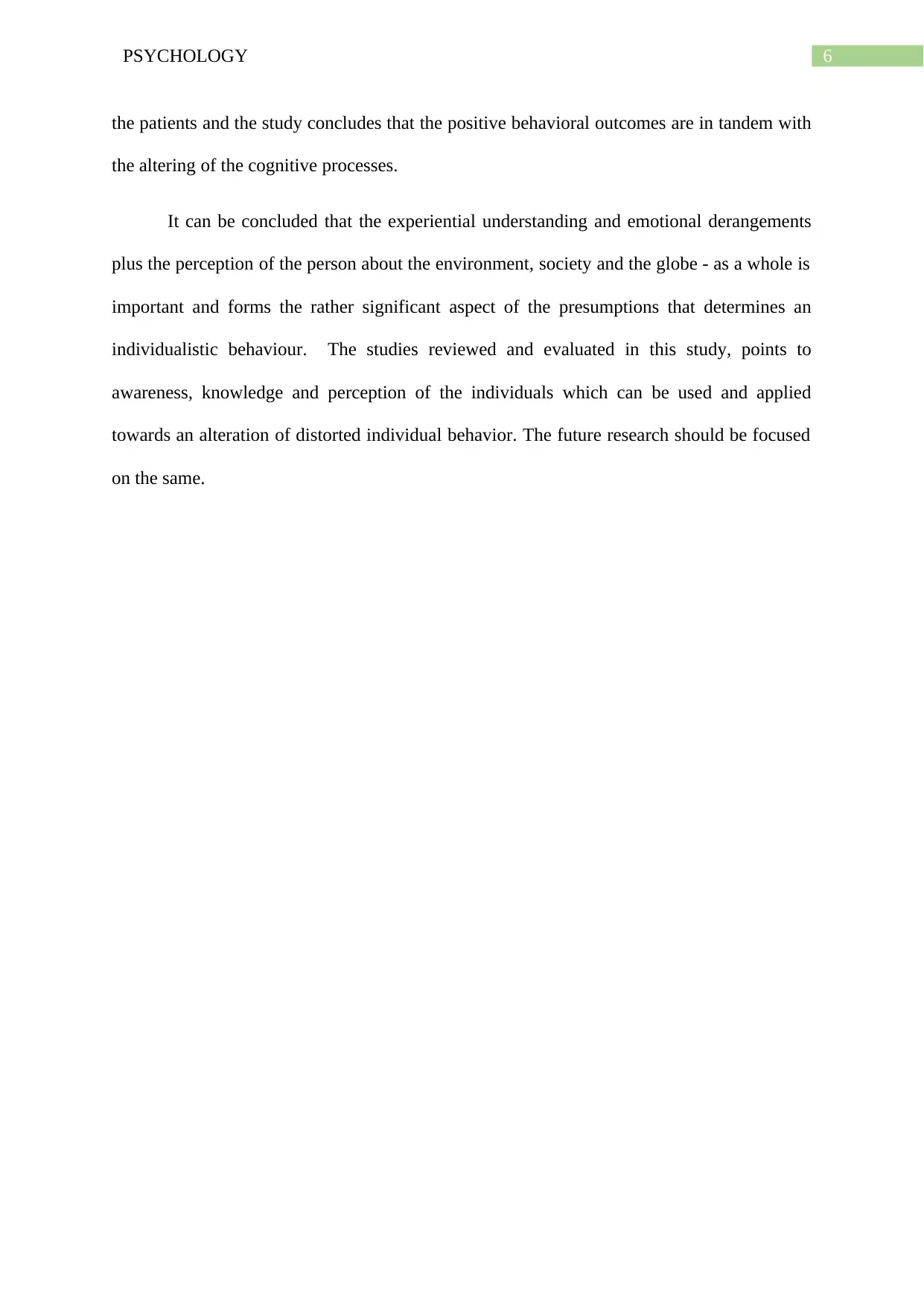
6PSYCHOLOGY
the patients and the study concludes that the positive behavioral outcomes are in tandem with
the altering of the cognitive processes.
It can be concluded that the experiential understanding and emotional derangements
plus the perception of the person about the environment, society and the globe - as a whole is
important and forms the rather significant aspect of the presumptions that determines an
individualistic behaviour. The studies reviewed and evaluated in this study, points to
awareness, knowledge and perception of the individuals which can be used and applied
towards an alteration of distorted individual behavior. The future research should be focused
on the same.
the patients and the study concludes that the positive behavioral outcomes are in tandem with
the altering of the cognitive processes.
It can be concluded that the experiential understanding and emotional derangements
plus the perception of the person about the environment, society and the globe - as a whole is
important and forms the rather significant aspect of the presumptions that determines an
individualistic behaviour. The studies reviewed and evaluated in this study, points to
awareness, knowledge and perception of the individuals which can be used and applied
towards an alteration of distorted individual behavior. The future research should be focused
on the same.
Paraphrase This Document
Need a fresh take? Get an instant paraphrase of this document with our AI Paraphraser
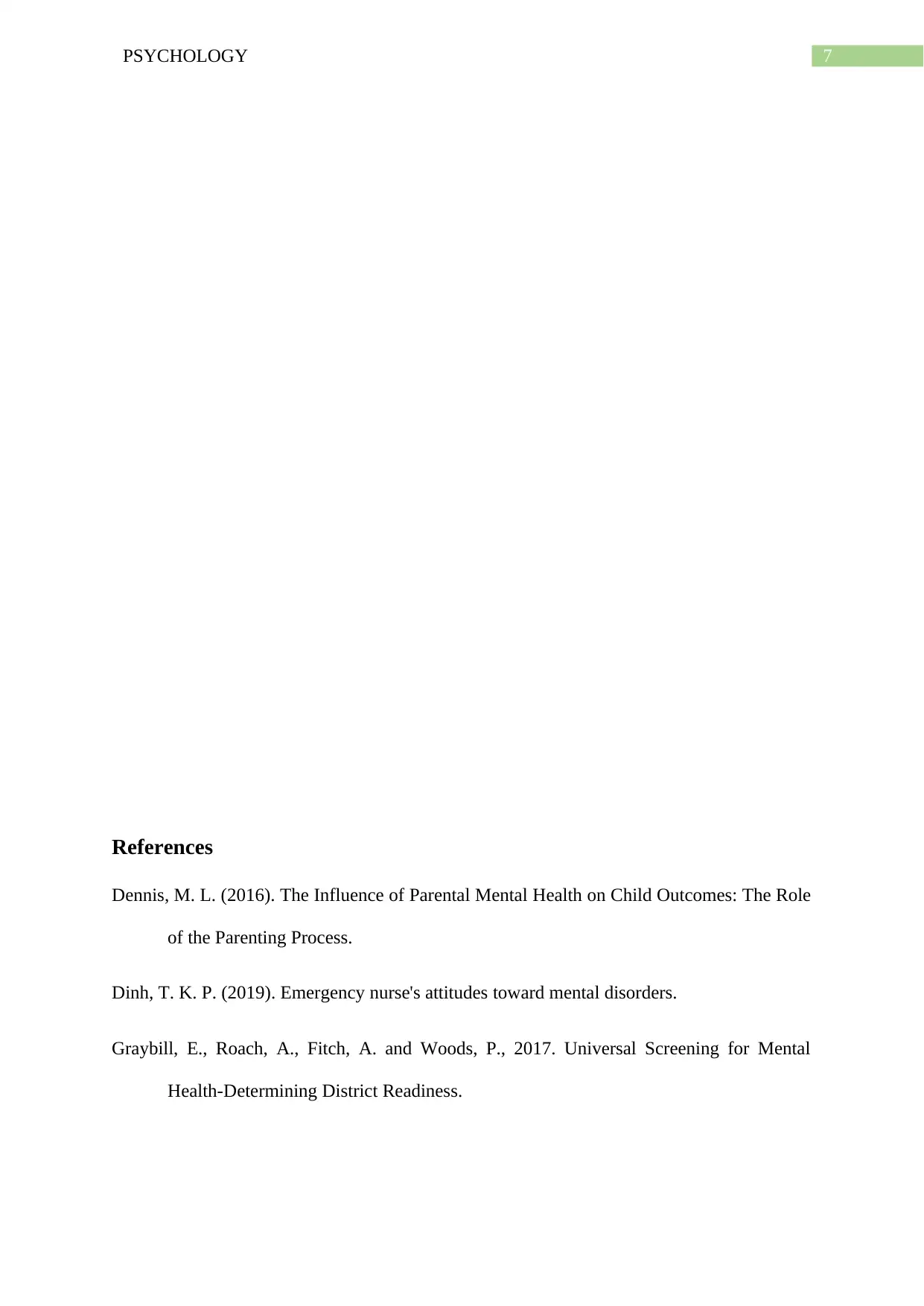
7PSYCHOLOGY
References
Dennis, M. L. (2016). The Influence of Parental Mental Health on Child Outcomes: The Role
of the Parenting Process.
Dinh, T. K. P. (2019). Emergency nurse's attitudes toward mental disorders.
Graybill, E., Roach, A., Fitch, A. and Woods, P., 2017. Universal Screening for Mental
Health-Determining District Readiness.
References
Dennis, M. L. (2016). The Influence of Parental Mental Health on Child Outcomes: The Role
of the Parenting Process.
Dinh, T. K. P. (2019). Emergency nurse's attitudes toward mental disorders.
Graybill, E., Roach, A., Fitch, A. and Woods, P., 2017. Universal Screening for Mental
Health-Determining District Readiness.
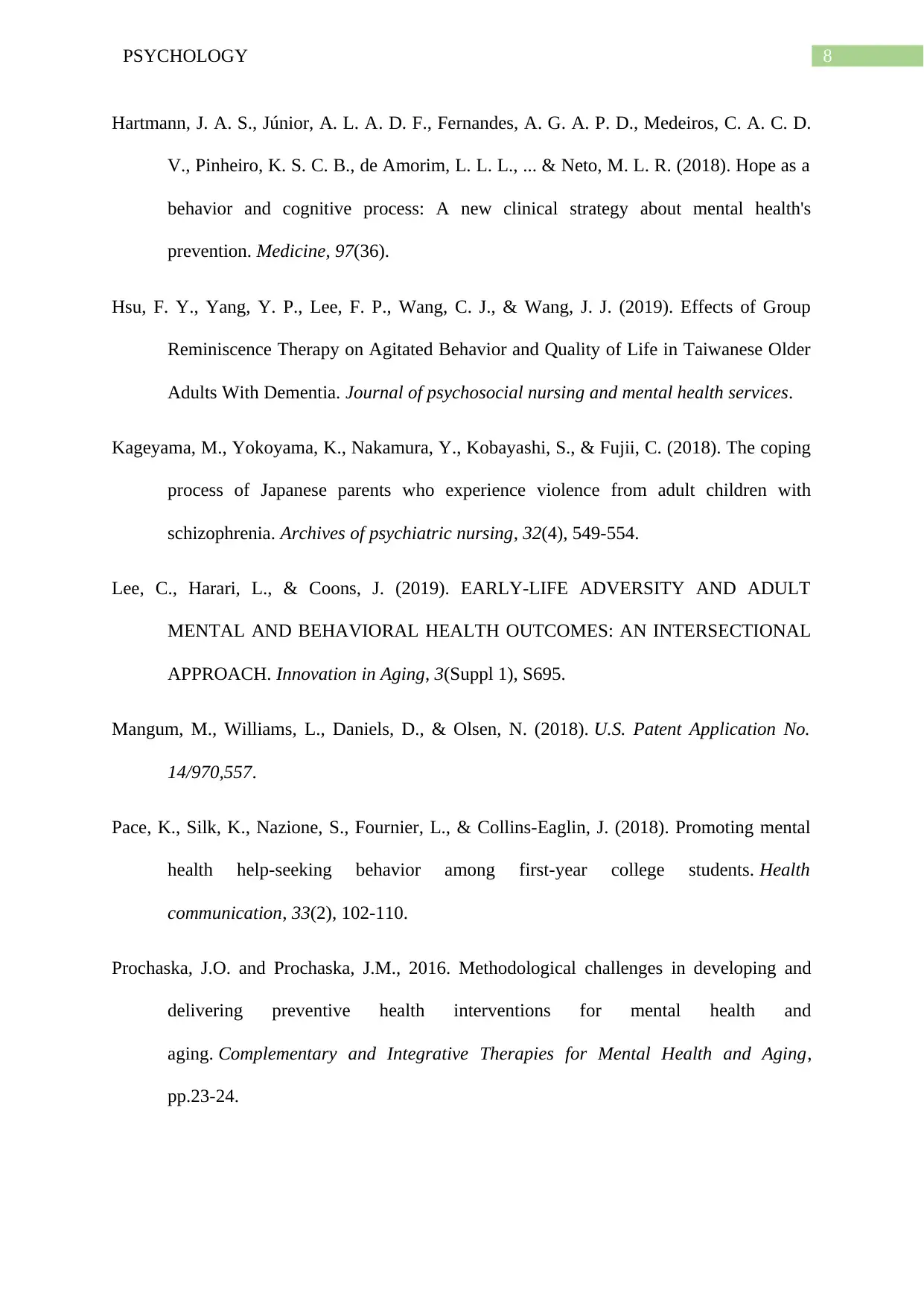
8PSYCHOLOGY
Hartmann, J. A. S., Júnior, A. L. A. D. F., Fernandes, A. G. A. P. D., Medeiros, C. A. C. D.
V., Pinheiro, K. S. C. B., de Amorim, L. L. L., ... & Neto, M. L. R. (2018). Hope as a
behavior and cognitive process: A new clinical strategy about mental health's
prevention. Medicine, 97(36).
Hsu, F. Y., Yang, Y. P., Lee, F. P., Wang, C. J., & Wang, J. J. (2019). Effects of Group
Reminiscence Therapy on Agitated Behavior and Quality of Life in Taiwanese Older
Adults With Dementia. Journal of psychosocial nursing and mental health services.
Kageyama, M., Yokoyama, K., Nakamura, Y., Kobayashi, S., & Fujii, C. (2018). The coping
process of Japanese parents who experience violence from adult children with
schizophrenia. Archives of psychiatric nursing, 32(4), 549-554.
Lee, C., Harari, L., & Coons, J. (2019). EARLY-LIFE ADVERSITY AND ADULT
MENTAL AND BEHAVIORAL HEALTH OUTCOMES: AN INTERSECTIONAL
APPROACH. Innovation in Aging, 3(Suppl 1), S695.
Mangum, M., Williams, L., Daniels, D., & Olsen, N. (2018). U.S. Patent Application No.
14/970,557.
Pace, K., Silk, K., Nazione, S., Fournier, L., & Collins-Eaglin, J. (2018). Promoting mental
health help-seeking behavior among first-year college students. Health
communication, 33(2), 102-110.
Prochaska, J.O. and Prochaska, J.M., 2016. Methodological challenges in developing and
delivering preventive health interventions for mental health and
aging. Complementary and Integrative Therapies for Mental Health and Aging,
pp.23-24.
Hartmann, J. A. S., Júnior, A. L. A. D. F., Fernandes, A. G. A. P. D., Medeiros, C. A. C. D.
V., Pinheiro, K. S. C. B., de Amorim, L. L. L., ... & Neto, M. L. R. (2018). Hope as a
behavior and cognitive process: A new clinical strategy about mental health's
prevention. Medicine, 97(36).
Hsu, F. Y., Yang, Y. P., Lee, F. P., Wang, C. J., & Wang, J. J. (2019). Effects of Group
Reminiscence Therapy on Agitated Behavior and Quality of Life in Taiwanese Older
Adults With Dementia. Journal of psychosocial nursing and mental health services.
Kageyama, M., Yokoyama, K., Nakamura, Y., Kobayashi, S., & Fujii, C. (2018). The coping
process of Japanese parents who experience violence from adult children with
schizophrenia. Archives of psychiatric nursing, 32(4), 549-554.
Lee, C., Harari, L., & Coons, J. (2019). EARLY-LIFE ADVERSITY AND ADULT
MENTAL AND BEHAVIORAL HEALTH OUTCOMES: AN INTERSECTIONAL
APPROACH. Innovation in Aging, 3(Suppl 1), S695.
Mangum, M., Williams, L., Daniels, D., & Olsen, N. (2018). U.S. Patent Application No.
14/970,557.
Pace, K., Silk, K., Nazione, S., Fournier, L., & Collins-Eaglin, J. (2018). Promoting mental
health help-seeking behavior among first-year college students. Health
communication, 33(2), 102-110.
Prochaska, J.O. and Prochaska, J.M., 2016. Methodological challenges in developing and
delivering preventive health interventions for mental health and
aging. Complementary and Integrative Therapies for Mental Health and Aging,
pp.23-24.
⊘ This is a preview!⊘
Do you want full access?
Subscribe today to unlock all pages.

Trusted by 1+ million students worldwide
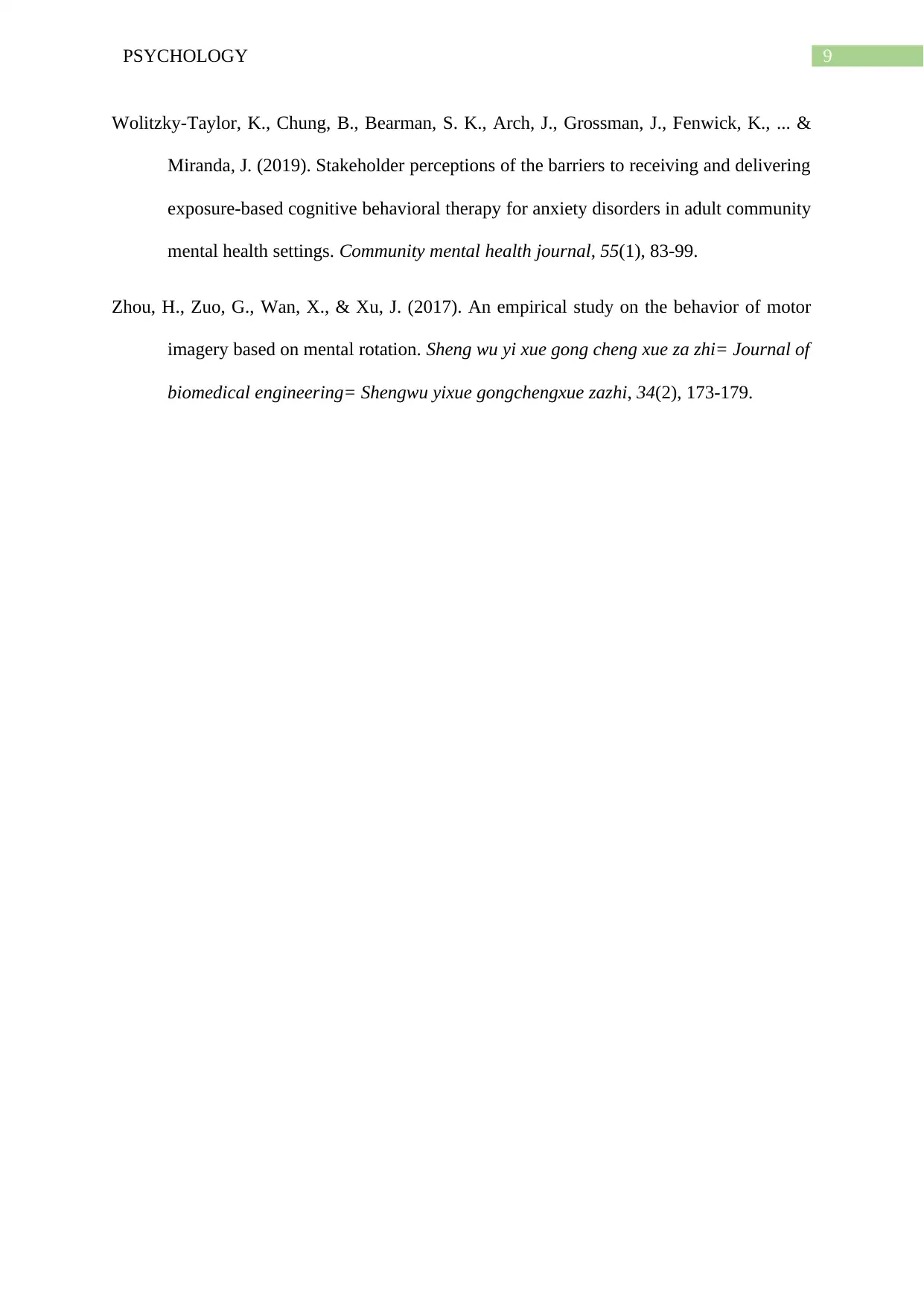
9PSYCHOLOGY
Wolitzky-Taylor, K., Chung, B., Bearman, S. K., Arch, J., Grossman, J., Fenwick, K., ... &
Miranda, J. (2019). Stakeholder perceptions of the barriers to receiving and delivering
exposure-based cognitive behavioral therapy for anxiety disorders in adult community
mental health settings. Community mental health journal, 55(1), 83-99.
Zhou, H., Zuo, G., Wan, X., & Xu, J. (2017). An empirical study on the behavior of motor
imagery based on mental rotation. Sheng wu yi xue gong cheng xue za zhi= Journal of
biomedical engineering= Shengwu yixue gongchengxue zazhi, 34(2), 173-179.
Wolitzky-Taylor, K., Chung, B., Bearman, S. K., Arch, J., Grossman, J., Fenwick, K., ... &
Miranda, J. (2019). Stakeholder perceptions of the barriers to receiving and delivering
exposure-based cognitive behavioral therapy for anxiety disorders in adult community
mental health settings. Community mental health journal, 55(1), 83-99.
Zhou, H., Zuo, G., Wan, X., & Xu, J. (2017). An empirical study on the behavior of motor
imagery based on mental rotation. Sheng wu yi xue gong cheng xue za zhi= Journal of
biomedical engineering= Shengwu yixue gongchengxue zazhi, 34(2), 173-179.
1 out of 10
Related Documents
Your All-in-One AI-Powered Toolkit for Academic Success.
+13062052269
info@desklib.com
Available 24*7 on WhatsApp / Email
![[object Object]](/_next/static/media/star-bottom.7253800d.svg)
Unlock your academic potential
Copyright © 2020–2026 A2Z Services. All Rights Reserved. Developed and managed by ZUCOL.





